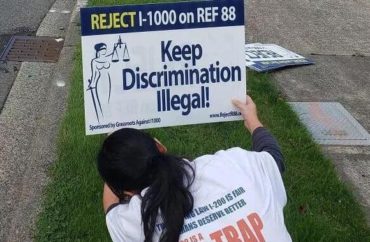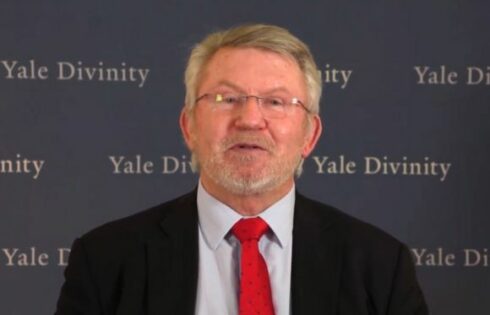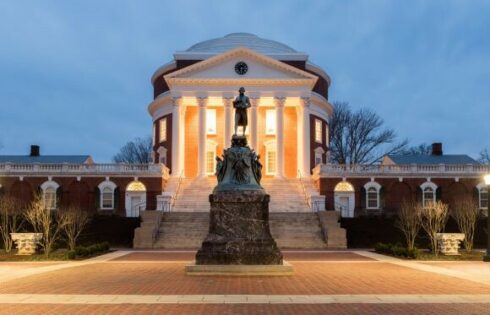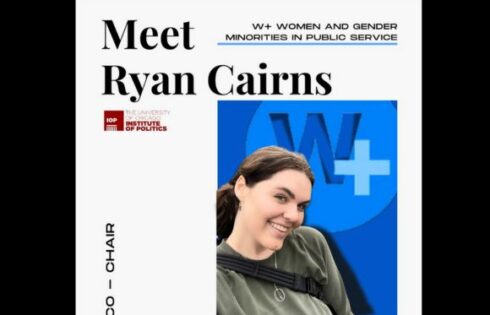
‘Will most likely result in racial discrimination against Asian Americans’
Washington state lawmakers overturned a 20-year-old ban on affirmative action in higher education earlier this year. Voters will get a chance to overturn their decision at the ballot box this fall, thanks to the efforts of a successful referendum campaign.
Let People Vote told supporters that it set a state record by collecting more than 200,000 signatures to challenge the Legislature’s Initiative 1000. By voting to “reject” Referendum 88 on the November ballot, voters will preserve Washington’s ban on affirmative action.
Just as Asian-American groups backed the unsuccessful lawsuit against Harvard University’s race preferences, they are also joining the campaign against the imposition of affirmative action in Washington.
“We are launching a national alliance with our partner organizations to support their [R-88] campaign,” Wenyuan Wu, director of administration for the Asian American Coalition for Education, told The College Fix in an email.
MORE: Lawmakers overturn voters to allow race, sex preferences in admissions
They consist of more than 260 partners, mostly grassroots Asian-American groups, including the Silicon Valley Chinese Association, Houston Chinese Alliance and Michigan Chinese Conservative Alliance.
I-1000 is a direct threat to equal opportunity for Asian Americans in the United States, Wu said.
It will “not advance the purported goal of ‘diversity, equity and inclusion,’” she said: “Instead, promoting affirmative action by redefining preferential treatment in restricted terms will most likely result in racial discrimination against Asian Americans in Washington State without delivering the intended benefits.”
A spokesperson for Let People Vote told The Fix it did not want to “disclose details” about its campaign to persuade voters to reject R-88. It did not respond to further inquiries.
‘Our college campuses are more diverse now’ than before ban
The One Washington Equality Campaign convinced the Legislature to approve I-1000 this spring, despite trouble raising money to pay its signature gatherers.
The initiative overturned I-200 from 1998, which banned preferential treatment based on race, sex, color, ethnicity or national origin in public education, employment and contracting.
I-1000’s stated purpose is to “guarantee every resident of Washington state equal opportunity and access to public education, public employment, and public contracting without discrimination based on” various protected traits.
Its Ballotpedia entry emphasizes that I-1000 does not authorize “quotas” or “preferential treatment,” where one trait is “the sole [or deciding] factor for selecting a lesser-qualified candidate over another.” It authorizes “affirmative action,” which allows various traits to be used as “factors” in public college admissions, hiring and the like.
MORE: College Republicans host affirmative action bake sale to protest new law
Let People Vote’s website against R-88 argues that it would create “a massive government agency,” unaccountable to voters, “to enforce the use of race in all aspects of government employment, college admissions and public contracting.”
By setting out “different rules for different races,” R-88 would “drive a deeper wedge into our community and actually empowers those who would divide us,” the campaign claims. I-200 has not harmed diversity: “Our college campuses are more diverse now than before the current law was enacted.”
The debate in Washington goes back to the 1970s, when then-Gov. Dan Evans proposed affirmative action provisions in lieu of hard quotas, The Spokesman-Review reported last month. The liberal Republican and namesake of the University of Washington’s Evans School appears in a commercial for I-1000, which he calls an improvement on I-200.
Let People Vote and another advocacy group, Grassroots Against I-1000, both “lean heavily on donations from Asian Americans,” according to the Spokesman-Review.
‘Deceptive verbiage and literary trickery’ violates federal law
In a letter intended for the Washington State Assembly, which approved the initiative before Wu’s group AACE could send it, the group wrote “on “behalf of over 600,000 Asian Americans in Washington State” asking for lawmakers to vote against I-1000, calling it inherently racist.
In a document entitled “I-1000 is a Supra-Constitutional, Political Measure Designed to Widen the Scope of Affirmative Action to Allow Preferential Treatment,” AACE said the initiative “resembled the verbiage” of Initiative 1644. It’s referring to a 2018 initiative that largely used the same language but failed to make the ballot.
The group characterized that initiative as an attempt to impose preferential treatment “by redefining preferential treatment.”
Contrary to its wording, “I-1000 could potentially legalize preferential treatment in which race or gender can take [the] place of merit as long as it is not the only factor,” the group said: “With such deceptive verbiage and literary trickery, this new definition is illegal and unconstitutional by federal standards.”
MORE: Campaign to reimpose race preferences is stiffing its contractors
It cited a 2014 Supreme Court decision known as Schuette, which upheld the constitutionality of Michigan’s ban on affirmative action in public college admissions.
“[A]ffirmative action must survive the scrutiny of the intrinsic/extrinsic test,” under which race is considered only “as a quality contributing to and evidencing other intrinsically valuable qualities of an applicant,” according to AACE. (The intrinsic/extrinsic test is not mentioned explicitly in the court’s opinion, concurrences or dissent, but has been laid out in a law review article in response to Schuette that advocates a specific definition of “preferential treatment.”)
By “reinventing the concept” of preferential treatment as something more intrusive than affirmative action, I-1000 would “greatly encourage racial discrimination against Asian-American students” in violation of the Ninth Amendment, the group argues.
Aside from court rulings, I-1000 ignores “current federal guidance on the use of race in college admissions,” AACE said. It requires “serious race-neutral alternatives [to] have been sought and exhausted” before considering race under a standard of “compelling government interests.”
MORE: Affirmative action policies punish minorities, too. I’m one of them.
IMAGE: Grassroots Against I-1000/Facebook
Like The College Fix on Facebook / Follow us on Twitter






Please join the conversation about our stories on Facebook, Twitter, Instagram, Reddit, MeWe, Rumble, Gab, Minds and Gettr.